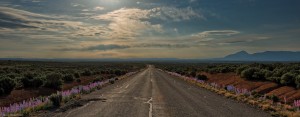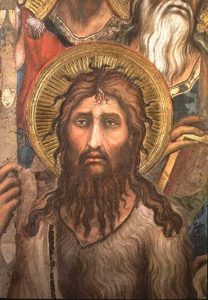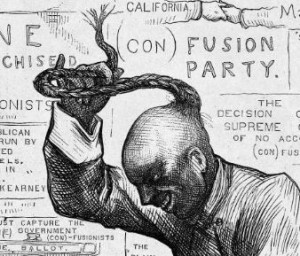====================
This sermon was preached on the Third Sunday of Advent, December 15, 2013, at St. Paul’s Episcopal Church, Medina, Ohio, where Fr. Funston is rector.
(The Revised Common Lectionary, Advent 3A: Isaiah 35:1-10; Canticle 15 (The Song of Mary, Luke 1:46-55); James 5:7-10; and Matthew 11:2-11. These lessons can be read at The Lectionary Page.)
====================

There are some numbers that made the news this week: 194 and 11,507. They are important numbers, numbers which represent an unpleasant reality of the world in which we live. I’ll return to them in a moment. but first let’s explore the Scriptures assigned to this, the Third Sunday of Advent, the second week in a row the Gospel focuses on John the Baptizer.
Last week we heard from John himself, this week we have Jesus asking people why they paid attention to John: “What did you go out into the wilderness to look at?” he asks them. “A prophet,” would be the correct answer, but more than a prophet – the forerunner of the kingdom of God. Jesus draws on the tradition of the prophet Malachi through whom God had said, “See, I am sending my messenger to prepare the way before me . . . . ” (Mal. 3:1) It was Malachi who predicted that the Messiah would be heralded by the return of Elijah: “I will send you the prophet Elijah before the great and terrible day of the Lord comes.” (Mal. 4:5) This was and remains in Judaism a traditional expectation known to all Jews. By equating John with Elijah, Jesus was announcing to one and all that, in himself, the reign of heaven had begun, that salvation was at hand. Some who heard him took this testimony seriously, but many others rejected. We take it seriously and because we do, we are preparing once again to celebrate Jesus’ birth.
We take it seriously that salvation is at hand, but what do we really mean when we use that word, “salvation”?
I know that many will say that salvation is a personal thing. “If you confess with your lips that Jesus is Lord and believe in your heart that God raised him from the dead, you will be saved,” wrote Paul to the Romans. Many people believe that what this means is that, doing those two things, each person will get into heaven when he or she dies.
On the other hand, we have the witness of the prophet Isaiah in today’s reading from the Old Testament that salvation is more communal than personal. God “will come and save you,” he says: “Then the eyes of the blind shall be opened, and the ears of the deaf unstopped; then the lame shall leap like a deer, and the tongue of the speechless sing for joy.” Hands that are weak will be strengthened, knees that are feeble will be made firm, and those who are fearful of heart will be made strong. Salvation is something that happens for the whole human community.
And not only is salvation communal, it is universal! Not only is salvation for the human community, it is for the whole of creation! “Waters shall break forth in the wilderness” and “the burning sand shall become a pool.” “The desert shall rejoice and blossom; . . . it shall blossom abundantly.”
Isaiah makes it clear that salvation is so much more than personal; it is so much more than simply getting into heaven when we die. Salvation is for everyone; it is for everything; and it is for the here-and-now. Jesus affirms this when John sends word to Jesus and asks, “Are you the one?” Jesus replies: “Tell John what you hear and see: the blind receive their sight, the lame walk, the lepers are cleansed, the deaf hear, the dead are raised, and the poor have good news brought to them.” Notice that everything Jesus says is present tense! It’s here! It’s now! It’s not “will be;” it’s not “might be;” it’s not sometime in the future. It’s not in heaven when we die! It’s here and it’s now!
So why, then, if salvation is for everyone and everything in the here-and-now, are we told to wait “until the coming of the Lord?” Why in our Epistle Lesson does James tell us to “be patient [as] the farmer waits for the precious crop from the earth, being patient with it until it receives the early and the late rains?” That question haunted me during my prayers and my meditations this past week as I thought about what to say this morning. As I pondered the question, however, I came to realize that I was focusing on the wrong things. I was looking at and questioning the waiting and the patience, and I should have been fixing my attention on the farmer.
I grew up in a farming family. My nuclear family weren’t farmers, but my maternal great-grandfather, Hinrich Buss, homesteaded several thousand acres of Kansas farmland in the late 1800s and quite a few of my Buss cousins to this day run farms on that land. Some grow corn and soybeans; others run dairy farms. I know from family example that while farmers do a lot of waiting and have to be patient people, they are never idle. “Waiting with patience” doesn’t mean sitting around doing nothing; to wait and be patient as a farmer patiently waits is to be active, to be attentive, to take a hand in bringing about that for which one is waiting.
Salvation that transforms the human community, that enables all creation to sing together in present and eternal joy happens as people’s eyes are opened to see and their ears are unstopped to hear both the Good News of God in their own lives and the needs of others to know that Good News in their lives. When that happens, the desert wilderness blooms and becomes a verdant landscape.
Passing through that lush landscape, says Isaiah, there will be a highway. “It shall be called the Holy Way” and the redeemed shall walk upon it to Zion, singing and rejoicing as they go. How will that highway get there? In a few more chapters, Isaiah will answer that question by saying to the People of God, “In the wilderness prepare the way of the Lord, make straight in the desert a highway for our God.” That highway, the highway of salvation, will get there because the People of God will build it!
There is an old story about a time of economic depression in France. The government decided that it would put the unemployed to work building roads. Initially, this worked well: the workers received paychecks, their spirits were high, and the government was pleased with itself. But then some of the laborers began to ask where the roads were leading. The government had to admit that these roads were simply make-work; they were going nowhere, just out into a swamp or something. The workers became dispirited; they lost a sense of purpose in their work. In a very real sense, their eyes were shut and their ears were closed up because they had been robbed of the hope that they were making life better for others and for themselves.
Salvation happens, the highway in the wilderness gets built, when there is hope; hope is there when our eyes and ears are opened to perceive that God is in our midst and to know that amazing things are possible. People of God have known this in every generation and they have seen it in every generation. God “has mercy on those who fear him in every generation.” God shows “the strength of his arm” and “scatter[s] the proud in their conceit” in every generation. God “cast[s] down the mighty from their thrones” and “lift[s] up the lowly” in every generation. God “fill[s] the hungry with good things” and sends “the rich . . . away empty” in every generation.
God does these things through God’s People who in every generation have seen Isaiah’s vision of a God of infinite and unstoppable hope, who in every generation have wondered how to see it more clearly, how to believe it more firmly, and how, like the patiently waiting farmer, to actively and attentively take a hand in transforming the often unpleasant desert realities in which they live.
I mentioned some numbers earlier, numbers that I suggested represent an unpleasant reality of the world in which we live: 194 and 11,507. Yesterday was the one-year anniversary of the murder of 20 children and six adults at Sandy Hook Elementary School in Newtown, Connecticut. We were tragically reminded of that massacre by another shooting incident on Friday at Arapahoe High School in suburban Denver, Colorado. In our country during the year between those two incidents, 11,507 people have died from gunshots; 194 of them have been children 12 years of age or younger. It is an unpleasant reality of the wilderness in which we still live, where we are still called to build the highway of salvation.
Let us pray:
Almighty God our heavenly Father, you have promised to come and save us as the eyes of the blind are opened and the ears of the deaf unstopped: Open our eyes and unstop our ears that we may know that you are in our midst and may share your vision of infinite and unstoppable hope, that we may do the work of transforming unpleasant realities and building the highway of salvation for all; for the sake of him who was and is and is to come, your Son Jesus Christ our Lord. Amen.
====================
A request to my readers: I’m trying to build the readership of this blog and I’d very much appreciate your help in doing so. If you find something here that is of value, please share it with others. If you are on Facebook, “like” the posts on your page so others can see them. If you are following me on Twitter, please “retweet” the notices of these meditations. If you have a blog of your own, please include mine in your links (a favor I will gladly reciprocate). Many thanks!
====================
Father Funston is the rector of St. Paul’s Episcopal Church, Medina, Ohio.
 When I was a kid growing up first in southern Nevada and then in southern California, the weeks leading up to Christmas (we weren’t church members so we didn’t call them “Advent”) were always the same. They followed a pattern set by my mother. We bought a tree and decorated it; we set up a model electric train around it. We bought and wrapped packages and put them under the tree, making tunnels for that toy train. We went to the Christmas light shows in nearby parks and drove through the neighborhoods that went all out for cooperative, or sometimes competitive, outdoor displays. My mother would make several batches of bourbon balls (those confections made of crushed vanilla wafers and booze) and give them to friends and co-workers. Christmas Eve we would watch one or more Christmas movies on TV, and early Christmas morning we would open our packages . . . carefully so that my mother could save the wrapping paper. Then all day would be spent cooking and watching TV and playing bridge. After the big Christmas dinner, my step-father and I would do the clean up, my brother and my uncle would watch TV . . . and my mother would sneak off to her room and cry. You see . . . no matter how carefully we prepared, no matter how strictly we adhered to Mom’s pattern, something always went wrong. We never got it right; Christmas never turned out the way my mother wanted it to be.
When I was a kid growing up first in southern Nevada and then in southern California, the weeks leading up to Christmas (we weren’t church members so we didn’t call them “Advent”) were always the same. They followed a pattern set by my mother. We bought a tree and decorated it; we set up a model electric train around it. We bought and wrapped packages and put them under the tree, making tunnels for that toy train. We went to the Christmas light shows in nearby parks and drove through the neighborhoods that went all out for cooperative, or sometimes competitive, outdoor displays. My mother would make several batches of bourbon balls (those confections made of crushed vanilla wafers and booze) and give them to friends and co-workers. Christmas Eve we would watch one or more Christmas movies on TV, and early Christmas morning we would open our packages . . . carefully so that my mother could save the wrapping paper. Then all day would be spent cooking and watching TV and playing bridge. After the big Christmas dinner, my step-father and I would do the clean up, my brother and my uncle would watch TV . . . and my mother would sneak off to her room and cry. You see . . . no matter how carefully we prepared, no matter how strictly we adhered to Mom’s pattern, something always went wrong. We never got it right; Christmas never turned out the way my mother wanted it to be. A Native American proverb instructs us, “When you were born, you cried and the world rejoiced; live your life in a manner that when you die, the world cries and you rejoice.” Today, on what would have been Sheryl Ann King’s 48th birthday, the world (you and me and everyone who knew and loved Sherry) is crying, but Sherry is rejoicing. “If you loved me,” Jesus told his followers, “you would rejoice that I am going to the Father” (Jn 14:28); we who love Sherry, let us rejoice (even through our tears) that she, too, has gone to the Father.
A Native American proverb instructs us, “When you were born, you cried and the world rejoiced; live your life in a manner that when you die, the world cries and you rejoice.” Today, on what would have been Sheryl Ann King’s 48th birthday, the world (you and me and everyone who knew and loved Sherry) is crying, but Sherry is rejoicing. “If you loved me,” Jesus told his followers, “you would rejoice that I am going to the Father” (Jn 14:28); we who love Sherry, let us rejoice (even through our tears) that she, too, has gone to the Father. Believe it or not, I’ve actually had the last of these selected verses quoted to me as part of an argument against the use of incense in the church. I was in a conversation with someone about our use of incense in “high church” liturgies, being told (among other things) that incense was fine when we were younger and acting like hippies but now that we are older and mature we should put aside such childish ways, when this chestnut was pulled out. Since I’ve studied the Old Testament (as most clergy have) I knew my critic was misusing the text.
Believe it or not, I’ve actually had the last of these selected verses quoted to me as part of an argument against the use of incense in the church. I was in a conversation with someone about our use of incense in “high church” liturgies, being told (among other things) that incense was fine when we were younger and acting like hippies but now that we are older and mature we should put aside such childish ways, when this chestnut was pulled out. Since I’ve studied the Old Testament (as most clergy have) I knew my critic was misusing the text.


 Several years ago I served in a small parish which had a very tight budget. Among its many cost-saving efforts was the reuse of altar flowers. Arrangements would be purchased and used on one Sunday, then quickly put away in the refrigerator in the basement kitchen to be used again the next week. Of course, they didn’t last as well as they might have been wished to (and some varieties of flower fared worse than others), so it was noticeable that they’d been around for awhile. In addition, if there’d been any sort of parish dinner in the interim so that food had been stored in the same refrigerator, they would often have taken on a bit of the odor of fried chicken or garlic or cheesy tuna surprise.
Several years ago I served in a small parish which had a very tight budget. Among its many cost-saving efforts was the reuse of altar flowers. Arrangements would be purchased and used on one Sunday, then quickly put away in the refrigerator in the basement kitchen to be used again the next week. Of course, they didn’t last as well as they might have been wished to (and some varieties of flower fared worse than others), so it was noticeable that they’d been around for awhile. In addition, if there’d been any sort of parish dinner in the interim so that food had been stored in the same refrigerator, they would often have taken on a bit of the odor of fried chicken or garlic or cheesy tuna surprise. 

